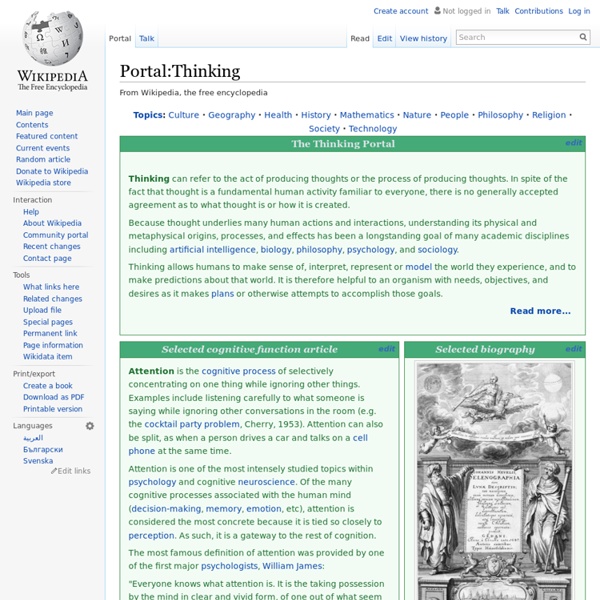



Portal:Philosophy Portal:Aesthetics From Wikipedia, the free encyclopedia Classicism, in the arts, refers generally to a high regard for classical antiquity, as setting standards for taste which the classicists seeks to emulate. The art of classicism typically seeks to be formal and restrained. Classicism is a force which is often present in post-medieval European and European influenced traditions, however, some periods felt themselves more connected to the classical ideals than others, particularly the Age of Reason, the Age of Enlightenment and some movements in Modernism. Arthur Coleman Danto (born 1924) is an American art critic, and professor of philosophy. Baumgarten appropriated the word aesthetics, which had always meant sensation, to mean taste or "sense" of beauty. Purge server cache
Lists of people Lists of people From Wikipedia, the free encyclopedia Jump to: navigation, search Contents [hide] By name[edit] By nationality, ethnicity, or location[edit] Main article: Lists of people by nationality By belief[edit] Lists of people by belief By associated physical condition or characteristic[edit] Lists of people by cause of death By condition[edit] By occupation[edit] By scholar area[edit] By achievement or status[edit] By circumstance[edit] Real people appearing in fiction[edit] Content listings Lists Indices Retrieved from " Categories: Hidden categories: Use dmy dates from May 2013 Navigation menu Personal tools Namespaces Variants Views Actions Navigation Interaction Tools Print/export Languages This page was last modified on 4 April 2014 at 22:02.
Portal:Metaphysics What is the meaning of life?What is the nature of reality?What is humanity's place in the universe?Does the world exist outside the mind?What is the nature of objects, events, places? Ludwig Josef Johann Wittgenstein (26 April 1889 – 29 April 1951) was an Austrian-Britishphilosopher who worked primarily in logic, the philosophy of mathematics, the philosophy of mind, and the philosophy of language. He helped inspire two of the century's principal philosophical movements: the Vienna Circle and Oxford ordinary language philosophy. Purge server cacheCite error: There are <ref> tags on this page, but the references will not show without a {{reflist}} template (see the help page).
Outline of self Self – individual person, from his or her own perspective. To you, self is you. To a different person, self is that person. Life stages/events[edit] Stages of life[edit] Major life events[edit] Individual rights[edit] Individual rights – much of the western world values the concept of individual rights. Security rights – protect people against crimes such as murder, massacre, torture and rape Security of person – liberty, including the right, if one is imprisoned unlawfully, to the remedy of habeas corpus. Components of self[edit] Personality traits[edit] Main articles: Big Five personality traits and Trait theory Harmful traits and practices[edit] Personal values[edit] Virtues[edit] Virtue – characteristic of a person which supports individual moral excellence and collective well being. Vices[edit] Main articles: Vice and Sufism Self-actualization[edit] Self-actualization – Self management[edit] Self-management – Self-preservation and self-maintenance[edit] Other personal concepts[edit] See also[edit]
Portal:Ethics Justice is the concept of moral rightness based on ethics, rationality, law, natural law, fairness, religion and/or equity.[1] 3 Stages of Sin Reference: Psalm 1 1) See / Hear (Steps of Wicked) 2) Stand (Way of Sinners) 3) Sit (Seat of Mockers) Author: Holy Spirit Purge server cacheCite error: There are <ref> tags on this page, but the references will not show without a {{reflist}} template (see the help page).
Category:Humans Subcategories This category has the following 22 subcategories, out of 22 total. Pages in category "Humans" The following 41 pages are in this category, out of 41 total.